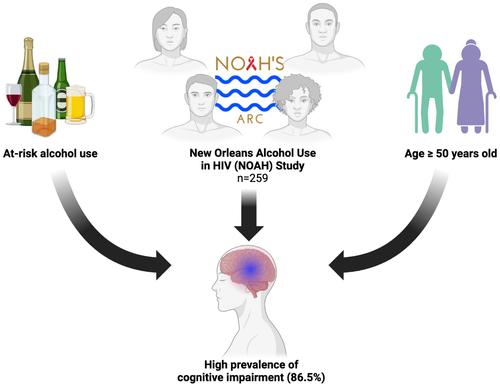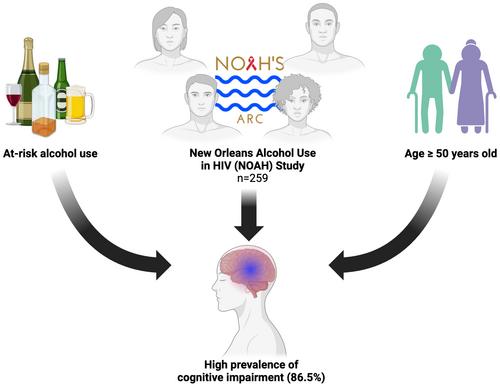Moderate-to-severe cognitive impairment is associated with both recent and chronic alcohol misuse in people with HIV: The New Orleans alcohol use in HIV (NOAH) study
Abstract
Background
Human immunodeficiency virus (HIV) profoundly impacts the nervous system, leading to neurological deficits including HIV-associated neurocognitive disorder (HAND). HAND represents the most common neurological comorbidity among people with HIV (PWH), and alcohol use may exacerbate cognitive deficits, especially in vulnerable populations. This study investigated relationships between alcohol use and cognition in an underserved cohort of PWH, on the hypothesis that alcohol misuse exacerbates cognitive deficits.
Methods
Data collected from participants (n = 259; 66.7% male; mean age 52 ± 10 years) enrolled in the New Orleans Alcohol Use in HIV (NOAH) study were utilized for cross-sectional analysis. Cognitive function was assessed using the Montreal Cognitive Assessment (MoCA), and alcohol use was comprehensively measured using four metrics: the Alcohol Use Disorders Identification Test (AUDIT), 30-day timeline follow back (TLFB), lifetime drinking history, and phosphatidylethanol (PEth) levels.
Results
The average MoCA score among participants was 20.7 ± 4.5, with 86.5% demonstrating cognitive impairment (MoCA < 26). Individuals with MoCA scores below 18 (moderately or severely cognitively impaired) had a higher frequency of recent severe alcohol misuse and greater lifetime alcohol consumption. Participants at increased risk for AUD (AUDIT ≥ 16) also had worse global cognition and memory task performance than those with lower AUDIT scores; this was particularly true among those aged 50 and older. Analysis of the MoCA sub-score data indicated that participants with increased AUD risk had impairments in the cognitive domains of language and memory.
Conclusions
Our findings demonstrate a high prevalence of cognitive impairment in the NOAH cohort and suggest that alcohol misuse contributes to global cognitive deficits in PWH, especially among individuals aged 50 and older. Further exploration of the impact of alcohol use on specific cognitive domains, including memory and language, should incorporate additional cognitive tasks. These findings highlight the importance of considering alcohol use and AUD risk as significant factors that may exacerbate cognitive deficits in vulnerable populations, including older PWH.



 求助内容:
求助内容: 应助结果提醒方式:
应助结果提醒方式:


